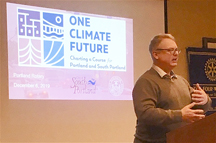 Our speaker was Troy Moon, who spoke about, “One Climate Future,” the collaborative climate action plan being hatched between Portland and South Portland. Only place that we know about where two adjacent cities are working together as equal partners to address the issues caused by climate change. One Climate Future’s mission: promoting a more sustainable path for our communities. Troy spoke of some of the successes that have occurred in the past year in solar policy, where the city is seeking to award a major contract for solar power generation. Portland was also the first city to shift to LED Lights and this alone has saved more than a million dollars of energy costs in its first year. Portland was the first place in Maine to regulate single use plastic bags, which are now subject to a statewide policy. The cities have been steeply regulated and in some cases banned the use of synthetic pesticides, and as for plastic straws: abolished. Gone. The cities are also establishing Energy benchmarking ordinances.
Our speaker was Troy Moon, who spoke about, “One Climate Future,” the collaborative climate action plan being hatched between Portland and South Portland. Only place that we know about where two adjacent cities are working together as equal partners to address the issues caused by climate change. One Climate Future’s mission: promoting a more sustainable path for our communities. Troy spoke of some of the successes that have occurred in the past year in solar policy, where the city is seeking to award a major contract for solar power generation. Portland was also the first city to shift to LED Lights and this alone has saved more than a million dollars of energy costs in its first year. Portland was the first place in Maine to regulate single use plastic bags, which are now subject to a statewide policy. The cities have been steeply regulated and in some cases banned the use of synthetic pesticides, and as for plastic straws: abolished. Gone. The cities are also establishing Energy benchmarking ordinances.The Coalition has a climate goal of 80% greenhouse gas reduction in our area by 2050, and by 2040, all power for city use will be from renewables.
Protesters led by students are drawing attention to the climate emergency. Students are urging action to speed up the emissions reduction, and have been pushing the city, as has Governor Mills’ ambitious energy agenda. All this is excellent work, but is it too late?
Many things are changing. Massive rainfall events are becoming more frequent, and high tide “blue sky” flooding is occurring in some of the lower-elevation parts of the city already. Troy talked about the “Bayside Adapts” project, which has the cities committing to manage sea level rise of 2 feet by 2050 and 4 feet by 2100. Yet, if nothing else is done and temperatures continue on its current trajectory, we will have as much as 11 feet of rise by 2100 – so these goals require massive coordination with the rest of the nation and the world.
Speaking of heat, we are already seeing record numbers of 100-degree days in summer. Climate could resemble that of mobile Alabama, if this curve is not bent and soon. Other subsidiary impacts include tick and mosquito borne illnesses on the rise. Lime ticks are now endemic in the region and mosquitoes are on the upsurge. And we will likely see more climate refugees. We will still have a better climate than other places and droughts in areas like Central Africa are already propelling migration.
It was a gloomy outlook overall, but Troy offered some hope for how we can have an effect here in greater Portland.
